Related Research Articles

Blonde on Blonde is the seventh studio album by the American singer-songwriter Bob Dylan, released as a double album on June 20, 1966, by Columbia Records. Recording sessions began in New York in October 1965 with numerous backing musicians, including members of Dylan's live backing band, the Hawks. Though sessions continued until January 1966, they yielded only one track that made it onto the final album—"One of Us Must Know ". At producer Bob Johnston's suggestion, Dylan, keyboardist Al Kooper, and guitarist Robbie Robertson moved to the CBS studios in Nashville, Tennessee. These sessions, augmented by some of Nashville's top session musicians, were more fruitful, and in February and March all the remaining songs for the album were recorded.

"All Along the Watchtower" is a song by American singer-songwriter Bob Dylan from his eighth studio album, John Wesley Harding (1967). The song was written by Dylan and produced by Bob Johnston. The song's lyrics, which in its original version contain twelve lines, feature a conversation between a joker and a thief. The song has been subject to various interpretations; some reviewers have noted that it echoes lines in the Book of Isaiah, Chapter 21, verses 5–9. Dylan has released several different live performances, and versions of the song are included on some of his subsequent greatest hits compilations.
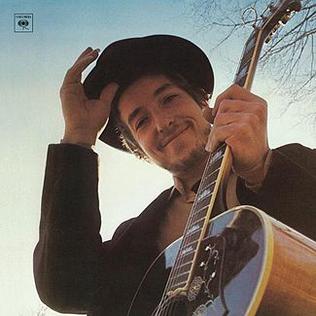
Nashville Skyline is the ninth studio album by the American singer-songwriter Bob Dylan, released on April 9, 1969, by Columbia Records as LP record, reel-to-reel tape and audio cassette.
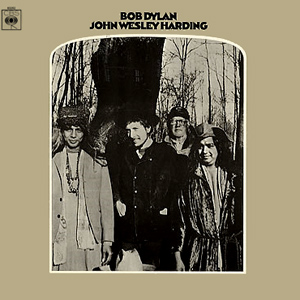
John Wesley Harding is the eighth studio album by the American singer-songwriter Bob Dylan, released on December 27, 1967, by Columbia Records. Produced by Bob Johnston, the album marked Dylan's return to semi-acoustic instrumentation and folk-influenced songwriting after three albums of lyrically abstract, blues-indebted rock music. John Wesley Harding was recorded around the same time as the home recording sessions with the Band known as The Basement Tapes.
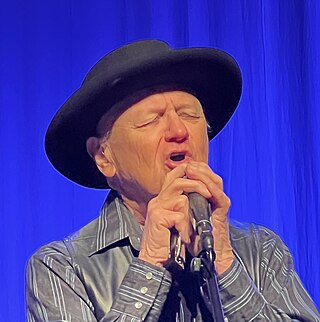
Charlie McCoy is an American harmonica virtuoso and multi-instrumentalist in country music. He is best known for his harmonica solos on iconic recordings such as "Candy Man", "He Stopped Loving Her Today", "I Was Country When Country Wasn't Cool", and others. He was a member of the progressive country rock bands Area Code 615 and Barefoot Jerry. After recording with Bob Dylan in New York, McCoy is credited for unknowingly influencing Dylan to decide to come to Nashville to record the critically acclaimed 1966 album Blonde on Blonde.
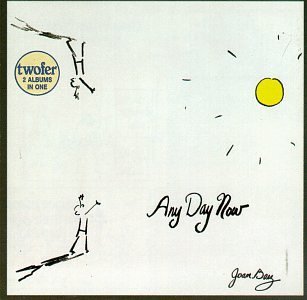
Any Day Now is the ninth studio album by Joan Baez, released as double LP in 1968 and made up exclusively of Bob Dylan songs. It peaked at number 30 on the Billboard Pop Albums chart.
"Absolutely Sweet Marie" is a song by American singer-songwriter Bob Dylan, which was released on the third side of the double album and Dylan's seventh studio album, Blonde on Blonde (1966). The song was written by Dylan and produced by Bob Johnston. It was recorded at around 1:00 am on March 8, 1966, at Columbia Studio A, Nashville. Some commentators have interpreted the song as being about sexual frustration.
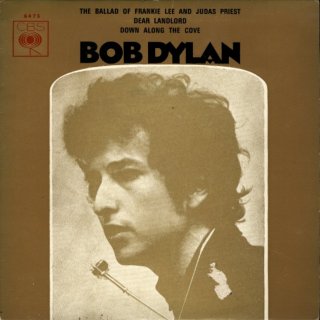
"The Ballad of Frankie Lee and Judas Priest" is a song by American singer-songwriter Bob Dylan. It was released as the fifth track on his eighth studio album John Wesley Harding (1967). The track was written by Dylan and produced by Bob Johnston. It was recorded in one take on October 17, 1967, at Columbia Studio A in Nashville. The song's lyrics refer to two friends, Frankie Lee and Judas Priest. Lee asks Priest for a loan of money and Priest offers it freely. Lee spends it in a brothel over 16 days, then dies of thirst in Priest's arms. It has been suggested by commentators that the song refers to Dylan's relationship with his manager Albert Grossman or to his contractual negotiations with his record company. The song received a mixed critical reception. Dylan performed the song live in concert 20 times, from 1987 to 2000.
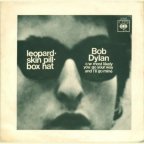
"Leopard-Skin Pill-Box Hat" is a song by the American singer-songwriter Bob Dylan, which was released on the second side of his seventh studio album Blonde on Blonde (1966). The song was written by Dylan, and produced by Bob Johnston. Dylan has denied that the song references any specific individual, although critics have speculated that it refers to Edie Sedgwick, whom Dylan had spent time with in December 1965.

"Just Like a Woman" is a song by the American singer-songwriter Bob Dylan from his seventh studio album, Blonde on Blonde (1966). The song was written by Dylan and produced by Bob Johnston. Dylan allegedly wrote it on Thanksgiving Day in 1965, though some biographers doubt this, concluding that he most likely improvised the lyrics in the studio. Dylan recorded the song at Columbia Studio A in Nashville, Tennessee in March 1966. The song has been criticized for sexism or misogyny in its lyrics, and has received a mixed critical reaction. Some critics have suggested that the song was inspired by Edie Sedgwick, while other consider that it refers to Dylan's relationship with fellow folk singer Joan Baez. Retrospectively, the song has received renewed praise, and in 2011, Rolling Stone magazine ranked Dylan's version at number 232 in their list of the 500 Greatest Songs of All Time. A shorter edit was released as a single in the United States during August 1966 and peaked at number 33 on the Billboard Hot 100. The single also reached 8th place in the Australian charts, 12th place on the Belgium Ultratop Wallonia listing, 30th in the Dutch Top 40, and 38th on the RPM listing in Canada.

"Rainy Day Women #12 & 35" is a song written and recorded by the American singer-songwriter Bob Dylan. Columbia Records first released an edited version as a single in March 1966, which reached numbers two and seven in the US and UK charts respectively. A longer version appears as the opening track of Dylan's seventh studio album, Blonde on Blonde (1966), and has been included on several compilation albums.

"I Want You" is a song by the American singer-songwriter Bob Dylan, which was released as a single in June 1966, and, later that month, on his seventh studio album, Blonde on Blonde. The song was written by Dylan, and produced by Bob Johnston. The song has been interpreted as a straightforward expression of lust, although critics have highlighted that the symbolism of the song is complex. It was the last song recorded for Blonde on Blonde, with several takes recorded in the early hours of March 10, 1966. It was included on Bob Dylan's Greatest Hits (1967). The song has received a largely positive critical reception, with a number of commentators highlighting Dylan's use of imagery, although some of the meanings are obscure.
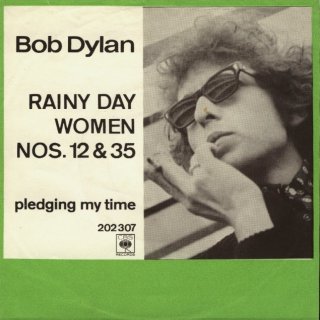
"Pledging My Time" is a blues song by the American singer-songwriter Bob Dylan from his seventh studio album, Blonde on Blonde (1966). The song, written by Dylan and produced by Bob Johnston, was recorded on March 8, 1966 in Nashville, Tennessee. Dylan is featured on lead vocals, harmonica, and guitar, backed by guitarist Robbie Robertson and an ensemble of veteran Nashville session men.
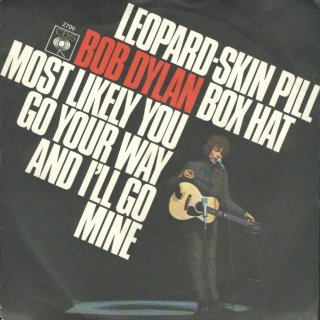
"Most Likely You Go Your Way and I'll Go Mine", or "Most Likely You Go Your Way (and I'll Go Mine)", is a song by the American singer-songwriter Bob Dylan. It was released as the first track on side three of his seventh studio album Blonde on Blonde (1966). The song was written by Dylan and produced by Bob Johnston. Dylan recounted that he had probably written the song after the end of a relationship. The song's narrator criticizes the lies and weakness of a woman, and says that he finds it hard to care. The final verse establishes that the woman has been unfaithful to the narrator by having a relationship with another man, as he suspected all along.
"I'll Keep It with Mine" is a song written by Bob Dylan in 1964, first released by folk singer Judy Collins as a single in 1965. Dylan attempted to record the song for his 1966 album Blonde on Blonde.
"I Am a Lonesome Hobo" is a song written and recorded by Bob Dylan, released in 1967 on his eighth studio album, John Wesley Harding. The song was produced by Bob Johnston.

The Original Mono Recordings is a box set compilation album of recordings by Bob Dylan, released in October 2010 on Legacy Recordings, catalogue 88697761042. It consists of Dylan's first eight studio albums in mono on nine compact discs, the album Blonde on Blonde being issued on two discs as in its original vinyl format. It does not include the singles collection Bob Dylan's Greatest Hits released during the same time span. The set includes a 56-page booklet with photographs, discographical information, and an essay by Greil Marcus. It peaked at No. 152 on the Billboard 200.
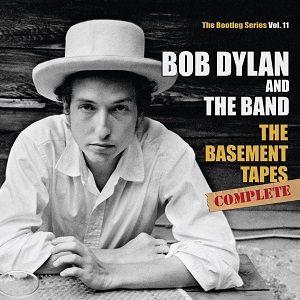
The Bootleg Series Vol. 11: The Basement Tapes Complete is a compilation album of unreleased home recordings made in 1967 by Bob Dylan and the group of musicians that would become the Band, released on November 3, 2014 on Legacy Records. It is the ninth installment of the Bob Dylan Bootleg Series, available as a six-disc complete set, and as a separate set of highlights – in a two-disc format common to the rest of the series – entitled The Basement Tapes Raw.

"Obviously 5 Believers" is a song by the American singer-songwriter Bob Dylan, which was released as the last track of side three of his double album Blonde on Blonde (1966), and was the B-side to the single release of "Just Like a Woman" for releases in America and some other countries. The song was written by Dylan and produced by Bob Johnston. It was recorded at Columbia Music Row Studios, in the early morning hours of a March 9–10, 1966 session. Four takes were recorded, although the first two were incomplete. It has been interpreted as a blues song about loneliness, with critics noting similarities in melody and structure to Memphis Minnie's "Chauffeur Blues". Dylan's vocals and the musicianship of the band on the track have both received critical acclaim, although the track has been regarded as insubstantial by some commentators.
"I Pity the Poor Immigrant" is a song by American singer-songwriter Bob Dylan. It was recorded on November 6, 1967, at Columbia Studio A in Nashville, Tennessee, produced by Bob Johnston. The song was released on Dylan's eighth studio album John Wesley Harding on December 27, 1967.
References
- ↑ Kosser, Michael (2006). How Nashville Became Music City, U.S.A.: A History Of Music Row. Lanham, Maryland, US: Backbeat Books. pp. 149–150. ISBN 978-1-49306-512-7.
- 1 2 3 4 5 6 7 8 9 Margotin, Philippe; Guesdon, Jean-Michel (2015). Bob Dylan All the Songs: The Story Behind Every Track. Black Dog and Leventhal Publishers. p. 294. ISBN 978-1579129859.
- 1 2 3 4 Trager, Oliver (2004). Keys to the rain: the definitive Bob Dylan encyclopedia. New York: Billboard Books. pp. 129–130. ISBN 0823079740.
- 1 2 Schlansky, Evan (March 31, 2009). "The Top 30 Bob Dylan Songs of All Time: Dear Landlord". americansongwriter.com. Archived from the original on August 11, 2020. Retrieved April 13, 2022.
- ↑ Heylin, Clinton (1995). Revolution in the Air – the songs of Bob Dylan Vol.1 1957–73. Constable & Robinson. pp. 454–456. ISBN 9781849012966.
- ↑ Jones, Mike (2013). "Underestimating Albert: revisiting Albert Grossman's management of Bob Dylan". Popular Music History. 8 (2): 189–204. doi:10.1558/pomh.v8i2.189.
- ↑ Gill, Andy (2011). Bob Dylan: the stories behind the songs 1962-1969. London: Carlton. pp. 188–189. ISBN 9781847327598.
- 1 2 Williams, Paul (2004). Bob Dylan, performing artist: the early years, 1960–1973. London: Omnibus Press. ISBN 1844490955.
- ↑ Jones, Allan (2015). "John Wesley Harding". Uncut: Bob Dylan. pp. 26–27.
- ↑ Beviglia, Jim (July 11, 2013). Counting Down Bob Dylan: His 100 Finest Songs. Scarecrow Press. p. 190. ISBN 978-0-8108-8824-1.
- ↑ "Setlists that contain Dear Landlord". bobdylan.com. Archived from the original on January 24, 2022. Retrieved April 12, 2022.